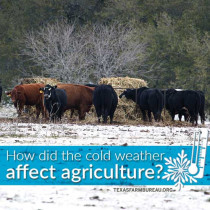YOUR TEXAS AGRICULTURE MINUTE
How does cold weather affect agriculture?
By Gene Hall
When the thermometer plunged into the teens last week, I was asked, “How will agriculture be affected?”
For farmers and ranchers, nothing really stops. Livestock must be fed. Ice must be broken from water troughs, so the animals can drink and other farm chores still must be done.
We expect cold weather in most of this state. The major crops growing this time of year are wheat and oats. In Texas, it’s not likely to get cold enough to destroy them. If it’s a dry cold, there will probably be some damage to tender vegetation. If there is snow, or even ice, less of that. In cold, these plants put out extra “tillers” that can increase yields. Significant damage is not likely. The Valley citrus crop came through fine. There was some damage to vegetables in the south.
On the good side, we’ve not had a good “bug killing” winter in a long time. Temperatures this low will kill some bugs. There will be less insect pressure on growing crops in the spring and summer.
Down on the farm, cold weather is just another thing for which to plan.
The preceding commentary is brought to you by Texas Farm Bureau, the “Voice of Texas Agriculture.” Called “Your Texas Agriculture Minute,” TFB will issue thought-provoking editorials each week—via print and audio—to spark understanding of agriculture in the Lone Star State and its impact on each and every Texan.
You may read this week’s editorial above or listen to the audio version.
Media outlets: This content may be used without further permission.

